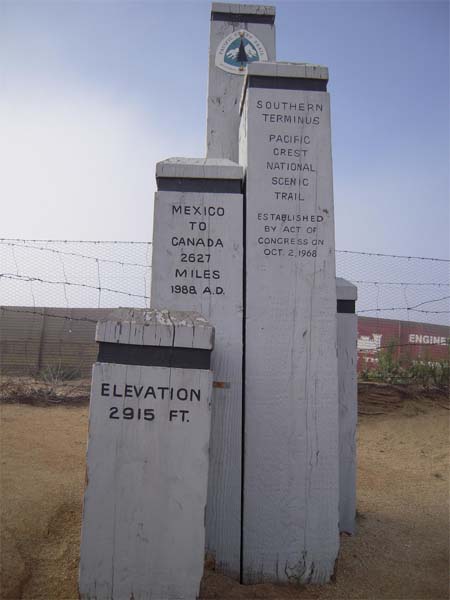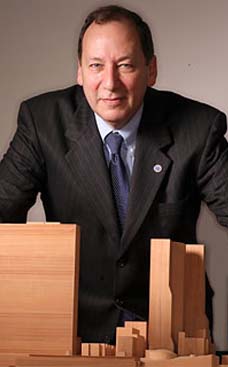
The first night after the Mexican border, I slept under an open sky with my hiking partner and another girl hiker. After 13 hot miles and no good campsites, we'd plopped down in a waterless flat spot next to the trail just big enough for three sleeping bags. Sometime in the wee hours, two groups of illegal immigrants came shuffling down the trail in the dark. They moved silently with purpose, but the small vibrations of their footfalls woke us immediately. One group consisted of three people, the next, perhaps 12. They carried nothing: no packs, no water. They wore heavy clothing. I think most were men, but I couldn't be sure. As we peeped out of our bags in surprise and silence, the passers-by stared back as they walked — never breaking stride — also in silence and, probably, bafflement. After my time in Peace Corps, I suddenly saw recreational backpacking as alien. What kind of lifestyle afforded us to "take off" six months and submit ourselves to pain, for pleasure, when people struggling to feed their families snuck across borders and used the same trail in desperation? What did we look like lying prone on the desert floor, surrounded by expensive gear "needed" for our wilderness trek — high-tech water purification systems, goose-down sleeping bags, quick-wicking clothing, waterproof silnylon food bags, like a bomb had detonated at L.L. Bean?
Ecuador RPCV Sarah Holt makes 2,663-mile hike along the Pacific Crest Trail
A 2,600-mile journey starts with stumble
news@TimesRecord.Com
01/05/2009
Caption: Southern Terminus of the Pacific Coast Trail Photo: asafantman Flickr Creative Commons Attribution-Noncommercial-Share Alike 2.0 Generic.
We invite our readers to join former Times Record reporter Sarah Holt on a 10-day series recounting her adventures during a five-and-a-half month, 2,663-mile hike along the Pacific Crest Trail.
By Sarah Holt, Times Record Contributor
BIG BEAR, Calif. — Two hundred and sixty-five miles north of the Mexican border along the Pacific Crest Trail lies the mountain settlement of Big Bear City, Calif.
The name is misleading. There is nothing big about Big Bear. Nor had I seen any bears, big or otherwise. Big Bear was, however, proving a friendly town … and a restful infirmary.
Having walked those 265 miles along the PCT, I'd wound up in a hostel here, nursing a swollen heel and rising frustration. A physician in another town 100 miles back informed me that my increase in activity had caused a microscopic tear in my left Achilles tendon. A fellow athlete, he'd taught me to tape my foot to restrict movement while backpacking, but urged a few days off. I followed orders, starting north again after the swelling subsided.
Now it was back with a vengeance. Ruefully, I remembered the physician's words: Nothing could guarantee success on my intended hike from Mexico to Canada. And I was barely 10 percent there.
It was early May. I had just returned to the United States after serving three years as a Peace Corps volunteer in Ecuador. Returned volunteers hit many snags in readjusting to American life, and I was hoping to temper that process.
A Pacific Crest Trail through-hike, which I'd dreamed about since through-hiking the 2,174-mile Appalachian Trail in 2004, offered not only a new challenge but a post-Peace Corps transition plan.
Instead of moping around I could spring into action — inventorying trail gear, visiting family and friends, reuniting with the hiking partner I'd met in the Peace Corps and flying with him to San Diego to start the trail together.
Reflecting on my Appalachian Trail hike from Georgia to Maine, I knew that a long trail was just the place to contemplate my new perspective and other uncertainties.
Solvitur ambulando — "It is saved by walking," ran a Latin expression I'd read somewhere. I would start walking, and in so doing would figure things out.
Well, here I was barely three weeks later, heel propped on a dripping ice pack, watching other hikers come and go.
What if my injury didn't heal? Would I have to quit? Where would I go?
I had no backup plan; this hike was supposed to take five-and-a-half months. What of my hiking partner? With mixed feelings I'd encouraged him to hike on, and he had. In 2004, I began my hike alone but finished with friends-for-life. Now I'd started with someone, but perhaps would finish alone — that is, if I were lucky enough to finish.
Pacific Crest Trail 101
The Pacific Crest Trail traverses 2,663 miles from Mexico to Canada through California, Oregon and Washington. It's the Wild West version of the Appalachian Trail.
Unlike the AT with its proximity to towns all along the East Coast, the PCT is remote: It takes you out there, out back, off the grid and into the wild.
The trail begins at the Mexican border, where a six-foot wooden monument waits near an ugly corrugated fence stretching in both directions. It leads you through southern California's sweltering deserts of chaparral, skirting many wind farms and the Mojave Desert, before climbing into the Sierra Nevada mountain range.
It bypasses Mt. Whitney, highest peak in the continental U.S., and threads eight mountain passes that are more than 11,000 feet. It meanders through northern California and forested Oregon, presided over by snowy volcanoes, before jolting dedicated followers into the slow-motion roller-coaster ride of Washington state.
Finally, this little footpath reaches into Washington's glaciated Cascade Range before depositing hikers at another wooden monument, identical to its Mexican counterpart, at the Canadian border.
Many things to many people
The first night after the Mexican border, I slept under an open sky with my hiking partner and another girl hiker. After 13 hot miles and no good campsites, we'd plopped down in a waterless flat spot next to the trail just big enough for three sleeping bags.
Sometime in the wee hours, two groups of illegal immigrants came shuffling down the trail in the dark. They moved silently with purpose, but the small vibrations of their footfalls woke us immediately.
One group consisted of three people, the next, perhaps 12. They carried nothing: no packs, no water. They wore heavy clothing. I think most were men, but I couldn't be sure.
As we peeped out of our bags in surprise and silence, the passers-by stared back as they walked — never breaking stride — also in silence and, probably, bafflement.
After my time in Peace Corps, I suddenly saw recreational backpacking as alien. What kind of lifestyle afforded us to "take off" six months and submit ourselves to pain, for pleasure, when people struggling to feed their families snuck across borders and used the same trail in desperation?
What did we look like lying prone on the desert floor, surrounded by expensive gear "needed" for our wilderness trek — high-tech water purification systems, goose-down sleeping bags, quick-wicking clothing, waterproof silnylon food bags, like a bomb had detonated at L.L. Bean?
These other walkers wore jeans and sweatshirts to stay warm in the chilly desert night; most had likely never used a sleeping bag. Sleep eluded me long after they'd past.
When the trail bore the prints of secondhand sneakers intermingled with our high-tech trail-runners, I thought back to why I'd found it so tough to explain my hike plan to many of my Ecuadorian friends. I had been embarrassed of my opportunity.
Much had come to pass these first three weeks. Now after six days in Big Bear, I was edgy as a caged coyote. It was time to test that Achilles. I would hike out tomorrow for the next stop, some 80 miles north. I wondered whether walking would, indeed, solve everything.













